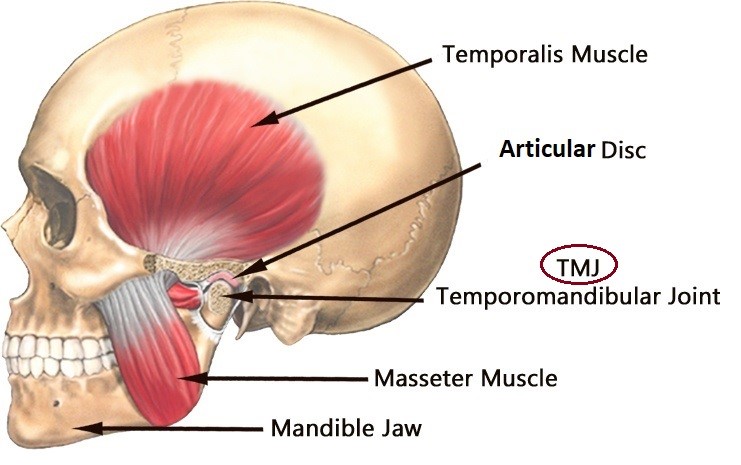
The Temporomandibular Joint (TMJ) is one of the jaw’s joint which connects the lower jawbone to the upper temporal bone of the skull (cranium).

The temporomandibular joints connect your lower jaw to your skull. When the mouth opens and closes, two distinct motions occur at the joint. The first motion is rotation around a horizontal axis through the condylar heads; and the second one is translation. TMJs are sliding “ball and socket” joints and dependent on proper alignment to work smoothly. TMJ joints are the most complex joints, which are frequently used in your body—cycling over 2,000 times per day when you talk, eat, and drink.
“TMJ Disorder” typically describes dysfunction of the jaw muscles and joints. It can be as minor as a slight clicking or popping sensation when the mouth is opened and closed, or as serious as persistent pain extending into the face, neck, and shoulders.
Many conditions can result in a misalignment of the jaw. When the upper and lower jaws are misaligned, this dysfunction can lead to pain and discomfort. This in turn places stress on the nerves, blood vessels, muscles and connecting tissues of the TM joints.
How do TMJ Disorders affect us?
TMJ disorders can cause a tremendous amount of pain, which can be debilitating and cause interference with our day to day functions. Common disorders from TMJ include: headaches, migraines, sinus pain, dizziness, popping jaw joints when eating or yawning, neck or facial pain, tingly fingers, low back pain and limited mouth opening. If you experience any of these, then you may have TMJ.
Under prolonged stress, your body may begin to compensate by adapting an unnatural position involving the neck, back or even your arms or pelvis.
Moreover, our daily life will be negatively affected because of jaw pain when chewing, limited opening of the mouth, clicking and popping of the jaw and teeth sensitivity.
Is TMJ Pain/Dysfunction popular?
Over 10 million Americans are plagued with chronic TMJ pain every day.
What causes TMJ Pain/Dysfunction?
The causes of TMJ pain can be attributed to many different problems such as arthritis, incorrect alignment of the bite (occlusion), jaw dislocation or injury, stress and grinding/clenching of teeth due to stress.

Teeth grinding due to stress can be a cause to TMJ Pain
What are TMJ Pain’s symptoms?
The most common symptoms are ear pain, headaches (around the forehead and eyebrows area), forward head posture, neck aches, jaw pain and soreness.
What are treatment benefits from Dynamic Dental Wellness?
Our comprehensive treatment includes two phrases to help Disorder TMJs back to normal function within their “happy” position; and align the teeth, correct bite as well as the jaw. Other significant benefits are:
If you or someone you know are suffering from TMJ pain, strange headache, neck & back pain or have forwarded head posture, please don’t hesitate to contact us at (703) 775-0002 to schedule a consultation with our doctors or click here to request an appointment.